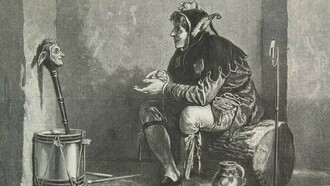The memoirs of Emma Courtney (1796) by Mary Hayes is one of the most philosophical of eighteenth-century novels. In the preface, she states that anything that sets the mind in motion is good. That free speaking and thinking are a virtue and the characteristic of a rational being. Her aim is not to represent her heroine as an idea of perfection but as a human being, presenting her errors as an offspring of sensibility, a warning, not an example.
Hume famously stated that reason is not a slave to passion. Passion is a motivating force that can be tempered by reason but not eradicated. It is a motivating force and a means for obtaining goals. Thus, Hayes suggests everyone receives sensations over which they have little power, as they depend on circumstances. It is these circumstances that influence the mind and determine future character. This can take the form of education, chance, or accident, and through the mind, strong thoughts and affection can take people in different directions.
Emma is raised by her uncle and aunt, where she reads tales of Arabian Nights and Turkish Tales. She describes her character as vain and self-willed, impetuous, impatient, and easily angered, but affectionate and warm. When she was sent away to boarding school by her father, her actions were constrained, with her passions torn from her with great difficulty, her grief unheeded, and her sensibility ridiculed. Although she found refuge in books, they were taken off her as punishment. At fourteen her uncle passed away, and she returned to live with her aunt, subscribing to a circulating library and reading 10-14 novels per week.
Novels were regarded as a corrupting influence, especially in relation to those distributed by circulating libraries. As her father had made little provision for his daughter, he felt she should be strengthened with fortitude and read books that would be useful. He felt her imagination had been developed by fiction, and she was ignorant of history and science. Her father gave her historical readings, and she loved the Greek and Roman Empires until they became corrupted by luxury, licentious, deceitful, and self-serving behavior. When looking at theology, she reads Descartes and begins to think about the nature of the soul. Upon returning to her aunt’s house, she could talk on various topics and was considered knowledgeable by her cousin, which flattered her vanity. While her father seeks to educate his daughter in preparation for her future life, the opposite view is also presented by characters in the book, suggesting knowledge and learning are seen as masculine and insufferable in a woman.
While her father seeks to strengthen her education through books, her aunt warns her not to strengthen an indulgent and impetuous nature, letting distrust undermine developing virtues. Inequality in society is regarded as fostering artificial wants, promoting jealous competition, and generating selfish and hostile passions. Her aunt speaks of the illusion of imagination undermining the discerning of truth and virtue, values that supplement the passions. She advises her to learn to distinguish the good and bad qualities of the people she meets and separate the person from their errors.
Due to Emma’s limited situation, her aunt refers to marriage as a financial affair and recommends she stay with her brother at Morton Park until she has a more independent plan. This raises the wider question for women about dependence and why they are not trained for commerce or labor, only to be rendered feeble by a delicate body and over-attention to artificial refinement.
Female propriety and reputation in the eighteenth century were essential in polite society; therefore, Emma’s lack of awareness of female indelicacy is exposed by her actions and attitude. Brought up in seclusion, all her ideas of honor and distinction were associated with the virtue and talent found in books. After a carriage accident, some malicious stories had been circulated by Mrs. Moreton that Emma had eloped with Mr. Montague. However, the good opinion of the world was only ever a secondary consideration to Emma.
In Emma’s correspondence with Mr. Francis, he tells her not to dwell on extremes, as this leads to deception and excessive sensibility. He states the miseries of mankind can be attributed to the vices and errors of political institutions. Also warning, the person who surrenders their understanding to another loses the dignity of a rational being and becomes a mere puppet. He states imposition is the foundation of every form of tyranny—civil, ecclesiastical, moral, or mental. Equally, he condemns obedience as surrendering ourselves to any foreign authority, quenching action, reason, and virtue. This view is in keeping with anti-Catholic ideas and the suspicion of France following thRevolution.olution.
After spending time with Mrs. Harley’s son, August, Emma develops an ideal view of him as an object of affection as outlined in romantic fiction. Rousseau stated that people do not consider the influence that a first impression makes on a man and a woman, which endures for the rest of their lives. When staying with the Harleys, she applies herself to languages, philosophy, criticism, grammar, and rules of composition. This time spent together caused her to attach more significance to their relationship. When she stays with her friend Mrs. Denbeigh, she writes to August but fails to get a satisfactory reply.
She feels she has been the victim of her own weakness. Yet she compares herself to Rousseau’s Julie, where a tender and faithful heart can never love another. He whom she loves appears as something more and everyone else as something less. Later in the novel we see the tragedy of this view when Mrs. Harley informs Emma that August had entered into a secret marriage three years ago with a foreigner who he had met on his travels. This causes Emma to reflect on the fact that she had been endeavoring to seduce a husband away from his wife. Virtue then becomes the calculation of the consequences of one's actions.
Morality is described as the practice and duty that we owe to ourselves and others, where individual happiness constitutes the general good. This idea foreshadows utilitarianism as the greatest happiness for the greatest number. The idea that man does right when pursuing his own interests and pleasure is not true, as he needs to be careful when seeking his own good; he does not render it incompatible with the good of others. Therefore, Emma’s pursuit of August is done in ignorance and not just her own interests; indeed, at the end of the novel, she agrees to take care of his son after his death.
Commentary about the slave revolts in the West Indies during the 1790s is introduced through a dinner party with a plantation owner. Emma is invited to agree with the ladies that soldiers are agreeable and charming men, to which she replies their trade is murder and their trappings gaudy pomp of sacrifice. She makes the distinction between common ruffians and thieves who are rendered desperate by passion, poverty, and injustice but use the wrong means to see themselves right, destroying the life and property of fellow human beings. Soldiers, she argues, wantonly and in cold blood kill millions, ravaging towns and cities. The planter's wife then turns to the domestic situation, complaining they cannot retain servants, and it was pointed out they will not tolerate being treated like slaves.
She is offended by having her judgment questioned by people she considers low, ignorant creatures who should obey the orders of their superiors. When questioned about thinking their superiors unreasonable, Mr. Melmouth states, What have servants or women to do with thinking?" This reflects the earlier point about education being a masculine preserve. When the ladies retire, Emma is chastised for being too hard on the gentlemen; she replies that being treated like an idiot was not a compliment and men who condescended to flatter despised the weak ladies they helped to form.
At the end of the novel, practicality triumphs over passion and sentiment with Emna marrying Mr. Montague after the loss of her small income. Equally, when August is brought to her home injured, she agrees to take care of his son in the event of his death. Therefore, despite Hayes’ argument that passion and sentiment undermine Emma’s life, reason and practicality win out.















